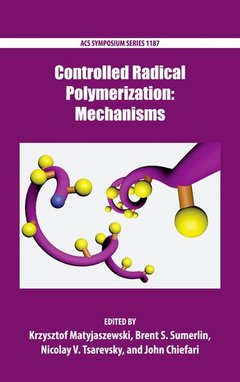Description
Controlled Radical Polymerization
Mechanisms
ACS Symposium Series
Coordinators: Matyjaszewski Krzysztof, Sumerlin Brent S., Tsarevsky Nicolay V., Chiefari John
Language: English
Subject for Controlled Radical Polymerization:
Publication date: 03-2016
352 p. · 16.3x22.9 cm · Hardback
352 p. · 16.3x22.9 cm · Hardback
Description
/li>Biography
/li>
This book and the following volume (1188: Controlled Radical Polymerization: Materials) are addressed to chemists and polymer scientists interested in radical processes, and especially in controlled/living radical polymerization. The chapters in this first volume summarize the most recent advances in the field, including mechanistic, materials, and applications aspects. Controlled/living radical polymerization (CRP) or reversible-deactivation radical polymerization (RDRP, as recommended by IUPAC) is among the most rapidly expanding areas of chemistry and polymer science. This first volume provides an overview of the current status of controlled/living radical polymerization (CRP) systems, and also discusses important issues relevant to all radical polymerization methods. The mechanistic and kinetic aspects of ATRP are also covered, as well as more complex mechanisms such as "hybrid" processes. Thirty-seven chapters published in two volumes show that there have been significant developments in CRP over the last 15 years. New systems have been discovered; substantial progress has been achieved in understanding the mechanism and kinetics of reactions involved in all CRP systems. As a result of these advances, significant progress has been made towards developing a comprehensive relationship between molecular structure and macroscopic properties. Several commercial applications of CRP have been announced and it is anticipated that new products made by CRP will soon be on the market.
Krzysztof Matyjaszewski is the J.C. Warner University Professor of Natural Sciences at Carnegie Mellon University. He has co-authored 880 publications, co-edited 17 books, and holds 51 U.S. patents as well as132 international patents. Matyjaszewski received the 2013 Inaugural AkzoNobel North America Science Award, the 2011 Wolf Prize in Chemistry, and the 2009 Presidential Green Chemistry Award in addition to seven honorary degrees. Brent Sumerlin is an associate professor in the department of chemistry at the University of Florida. He has been named a Kavli Fellow, an Alfred P. Sloan Research Fellow, and a Gerald J. Ford Research Fellow. He is also a Fellow of the Royal Society of Chemistry. Nicolay V. Tsarevsky is an assistant professor of chemistry at Southern Methodist University in Dallas, TX. He has published 78 peer-reviewed papers and book chapters, co-authored one textbook and co-edited three books, and is the co-inventor on several patents. John Chiefari is a research leader in CSIRO's Manufacturing Flagship. He is a co-inventor and co-developer of the RAFT process, which has been commercialized with products in the U.S., Europe, Australia, and Japan. He is currently managing CSIRO's research activities to extend the utility of the RAFT process and to explore new application areas in the biomedical, agricultural, personal care, and industrial chemical fields.
© 2024 LAVOISIER S.A.S.




